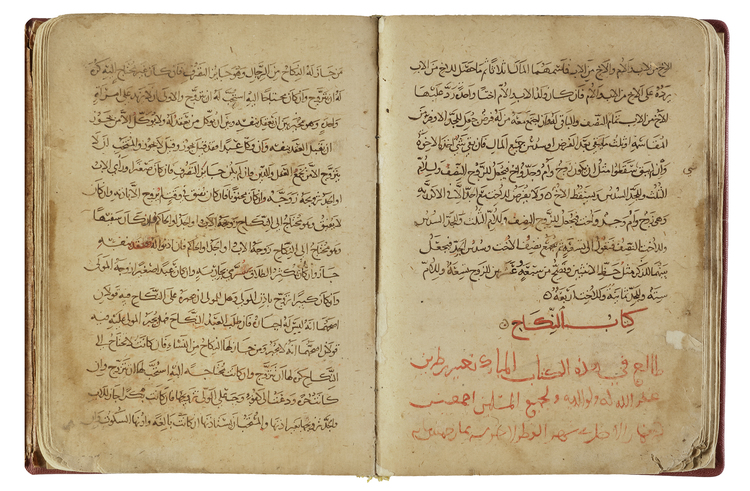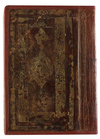KITAB AT-TANBIH BY AL-SHIRAZI, LATE 11TH CENTURY
Arabic manuscript on paper, 15 lines to each page, written in black naskh script. Kitab at-Tanbih (The book of warning), a compendium of law, very concise and somewhat obscure, full of hints at the discrepancies of opinion among Shāfi‛ite jurists on individual issues, and intended to be memorized by students before moving on to the great treatises and commentaries, one of the most prominent books of jurisprudence in the Shafi’i school, it includes chapters of purity, prayer, funerals, alms and fasting. It also includes chapters about Hajj, sales, duties, marriage, faith, expenses, felonies, distinctions, testimonies, and other fiqh books, in which the author deals with all the details and rulings related to them in an accessible and fluid language. With red morocco leather binding. Different seal impressions with ownership statement: one dated 507 AH/ 1113 AD which is not long after the death of the author, another ownership statement dates 740 AH/1339 AD 12 by 17 cm.
CATALOGUE NOTE ABU ISḤAQ AL-SHIRAZI, Ibrahim ibn ‛Ali ibn Yusuf al-Firuzabadi. One of the leading Muslim jurists of the Shafi‛ite school. He was born in Fīruzabad of southern Persia (near Shiraz) in 393 AH/1003 AD, but to deepen himself in theology and law he first went to al-Baṣrah and then to Baghdad, where he settled definitively and where he began to give public lectures in 430 AH. He immediately acquired extraordinary fame for his doctrine and for his pious and virtuous life, so that from all Muslim countries by students and people eager to obtain responses on theoretical questions of law, flocked to him. Like almost all Shafi‛ites, in theology he adhered to the system of al-Ash‛arī, Which he had the opportunity to defend even materially with his authority against the bloody attacks of the ḥanbalites. When the famous wazir or prime minister Niẓam al-Mulk, founded the first and famous madrasah (high school of religious sciences with college), called an-Niẓāmiyyah, in the penultimate month of 459 AH/ 1066 AD, he wanted Abu Isḥāq to be the director of the school and stayed so until his death in Baghdad in 476 AH/1083 AD. Most of his books are of Shafi‛ite law.







